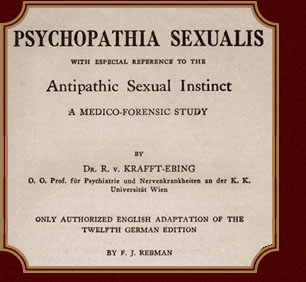RICHARD KRAFFT-EBBING, German psychiatrist died (b. 1840); Austro-German psychiatrist who wrote Psychopathia Sexualis (1886), a famous study of sexual perversity, and remains well-known for his coinage of the term “sadism” (after the Marquis de Sade). He also coined the term “masochism” using the name of a contemporary writer, Leopold von Sacher-Masoch, whose partially autobiographical novel Venus in Furs tells of the protagonist’s desire to be whipped and enslaved by a beautiful woman.
After interviewing many homosexuals, both as his private patients and as a forensic expert, and reading some works in favor of Gay rights (male homosexuality had become a criminal offence in Germany and the Austro-Hungarian Empire by that time; unlike Lesbianism, but discrimination against Lesbians functioned equally), Krafft-Ebing reached the conclusion that both male and female homosexuals did not suffer from mental illness or perversion (as persistent popular belief held), and became interested in the study of the subject.
Krafft-Ebing elaborated an evolutionist theory considering homosexuality as an anomalous process developed during the gestation of the embryo and fetus, evolving into a sexual inversion of the brain.
Some years later, in 1901, he corrected himself in an article published in the Jahrbuch fur sexuelle Zwischenstufen, changing the term anomaly to differentiation. But his final conclusions remained forgotten for years, partly because Sigmund Freud’s theories captivated the attention of those that considered homosexuality a psychological problem (the majority at the time), and partly because Krafft-Ebing had incurred some enmity from the Austrian Catholic church by associating the desire for sanctity and martyrdom with hysteria and masochism (besides denying the perversity of homosexuals).
